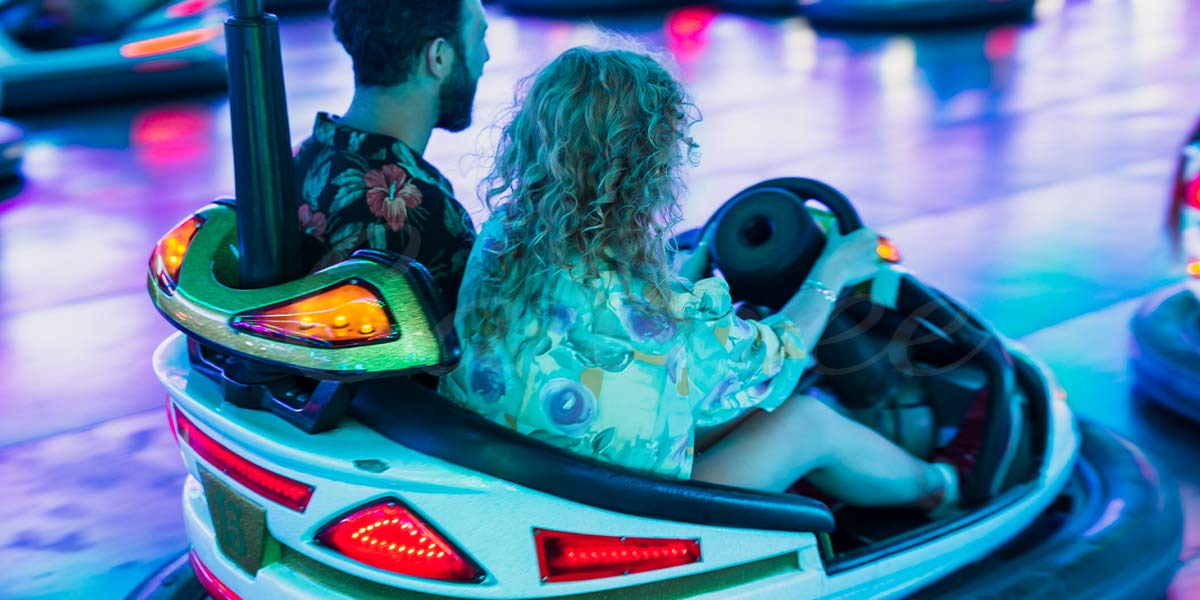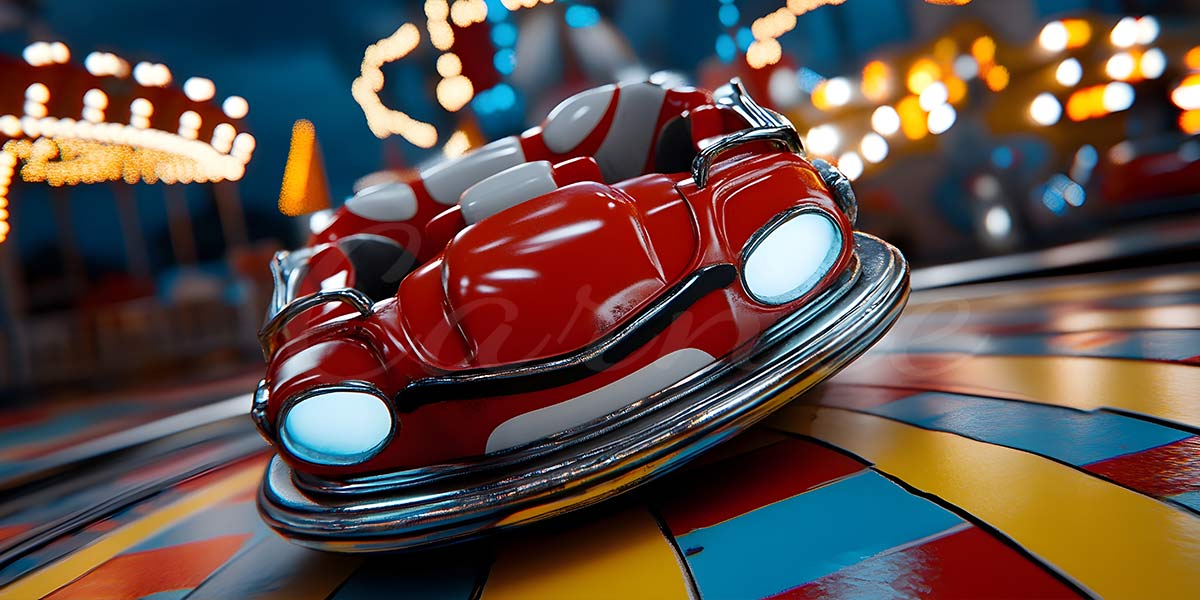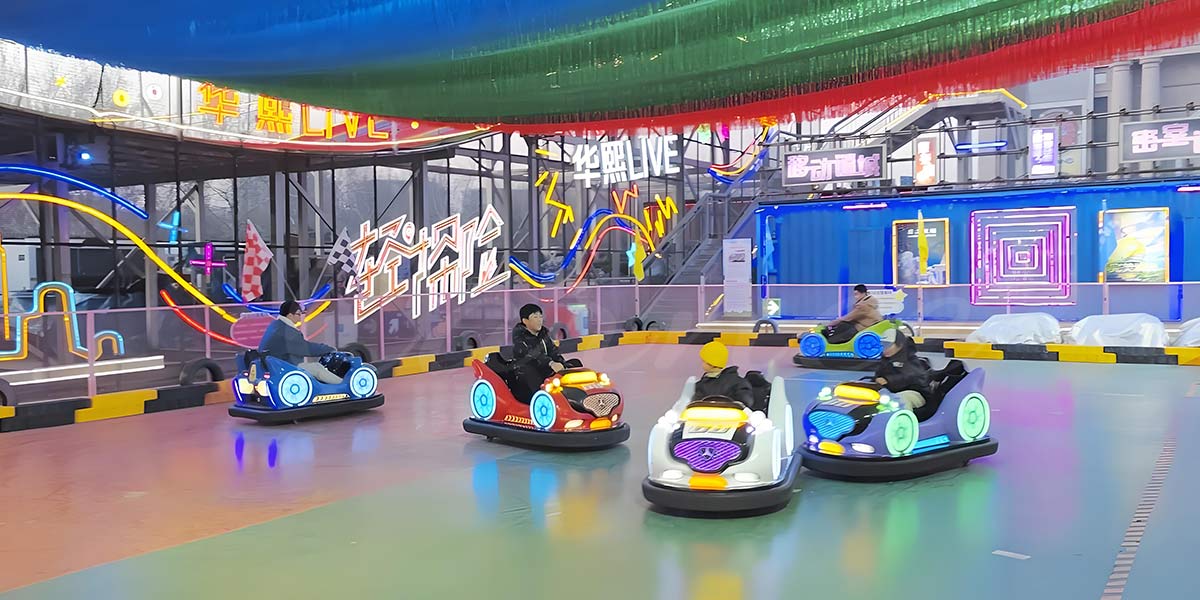If you're considering adding electric bumper cars to your amusement park or carnival, or if you're simply curious about how they work, this comprehensive FAQ will cover everything you need to know. From understanding how bumper cars work, to choosing the right model, and even maintenance tips, we’ve got you covered!

Electric bumper cars, also known as dodgems, are small, electrically powered vehicles designed for safe collisions and maneuvering. These cars typically operate using either a ceiling grid system or a floor grid system that provides power to the car's motor via a metal pole or conductive floor. They are commonly found in amusement parks or indoor entertainment centers, offering a fun and safe collision experience.
There are several types of electric bumper cars designed for various setups and environments:
Ceiling Grid Bumper Cars: These cars use an overhead grid to supply power via a metal pole, ideal for large indoor arenas.
Ground Grid Bumper Cars: These cars connect to a conductive floor, offering more flexibility for outdoor or temporary installations.
Battery-Powered Bumper Cars: These models rely on onboard batteries, making them versatile and perfect for environments without the need for an external grid system.
Each type offers unique benefits, with battery-powered bumper cars providing flexibility and ease of installation for temporary events, while grid-powered bumper cars ensure stable performance in permanent setups.
The speed of electric bumper cars generally ranges from 0.75 mph to 3.5 mph, depending on the model and safety requirements. Children's bumper cars typically have lower speed limits for safety, while adult models may allow for faster speeds. These speeds are designed to allow for fun and safe collisions while providing a thrilling experience for visitors of all ages.
Yes, electric bumper cars are designed with safety as a priority. Key safety features include:
Safety belts to secure riders.
Padded interiors to reduce injury during collisions.
Controlled environments in which the ride takes place.
Regular maintenance and adherence to safety guidelines are essential to ensure that bumper cars remain safe for all users. Amusement parks must follow industry-standard safety protocols to provide a secure and enjoyable ride experience.
Yes, like all amusement rides, electric bumper cars require regular maintenance to ensure smooth and safe operation. Common maintenance tasks include:
Checking electrical connections to prevent power loss.
Inspecting motors and batteries for wear and tear.
Ensuring safety features, such as seat belts and bumpers, are functioning properly.
Regular checks can reduce downtime and help extend the lifespan of your bumper cars.

To reduce maintenance costs, consider the following tips:
Perform routine inspections to identify and address minor issues before they become major problems.
Train staff to handle basic repairs, avoiding unnecessary service calls.
Use high-quality components that are less likely to wear out over time.
Properly maintaining your bumper cars can significantly reduce long-term operational costs.
The price of electric bumper cars typically ranges from $1,000 to $1,600 per unit for standard grid-powered models. Battery-powered bumper cars tend to cost more due to their design and portability. Keep in mind that additional setup costs, such as purchasing floor grids or providing arena space, may increase the overall investment.
See more: Bumper Car Buying Guide: 5 Must-Know Tips
Electric bumper cars can be a profitable investment for amusement parks. They attract large crowds, generate consistent ticket sales, and are relatively low-maintenance. The initial setup cost for a bumper car arena may range from $46,000 to $53,000 for a 400-square-meter area, but the return on investment can be substantial over time.
To safely operate electric bumper cars, ensure the following:
Car inspection: Perform a pre-ride check to ensure all electrical and mechanical components are functioning properly.
Rider guidelines: Make sure riders follow all safety instructions, including wearing seat belts.
Staff training: Train operators to handle minor issues and ensure safe car operations.
Regular training and maintenance will ensure safe bumper car rides for everyone.
Height and weight restrictions for bumper car rides vary by model but generally, they are designed to accommodate riders of various sizes. Typically, children must be at least 3 to 4 feet tall to ride, and there may be a weight limit of around 150 pounds per car. Always check the manufacturer’s guidelines for specific restrictions.
Typically, no special equipment is required to ride electric bumper cars. However, it’s recommended to wear comfortable clothing and closed-toe shoes for safety and ease of movement. Always follow the safety guidelines provided by the amusement park or ride operator.
Electric bumper cars are manufactured using durable materials like metal for the frame and plastic for the body. The manufacturing process involves assembling the electric motor, wiring the power system, and adding safety features such as seat belts and bumpers. These cars are built to withstand regular use in high-traffic amusement settings.
The manufacturing and delivery time for electric bumper cars typically takes around 4-6 weeks. The time may vary depending on order quantity, customization, and location. It’s always a good idea to consult directly with the manufacturer for more accurate delivery timelines.

Electric bumper cars are typically shipped from China via sea freight. Delivery time depends on destination, order size, and shipping conditions. It usually takes several weeks to ship from China to global locations, so it’s important to plan ahead for timely deliveries.
Most electric bumper cars are designed for indoor use. While battery-powered bumper cars may be more suitable for outdoor environments, using grid-powered bumper cars outdoors can affect performance. Always consult the manufacturer about weather limitations and best practices for outdoor bumper car rides.
The number of bumper cars needed depends on the size of the ride area and expected visitor traffic. A general guideline is to have 10-15 square meters of space per car to ensure a safe and enjoyable ride experience. More cars may be needed during peak periods.
Bumper cars on ice are adapted versions of traditional electric bumper cars designed to operate on ice surfaces. They feature specialized tires that provide traction on slippery surfaces. This variation offers a unique experience for winter months or indoor ice rinks, combining fun and novelty for visitors.
The maintenance cycle for electric bumper cars depends on usage frequency and environmental conditions. Routine maintenance tasks include checking the electrical system, inspecting the tires, and ensuring safety components like seat belts are working. Comprehensive checks are typically done annually, while basic inspections should be performed monthly.
Whether you are looking to purchase electric bumper cars for an amusement park, carnival, or entertainment center, understanding the different types, installation requirements, and maintenance details is essential. By following these guidelines, you can ensure your bumper car rides are both profitable and enjoyable for visitors of all ages.

Please contact us for free quotation by form below. We promise the quickest response within 24 hours: